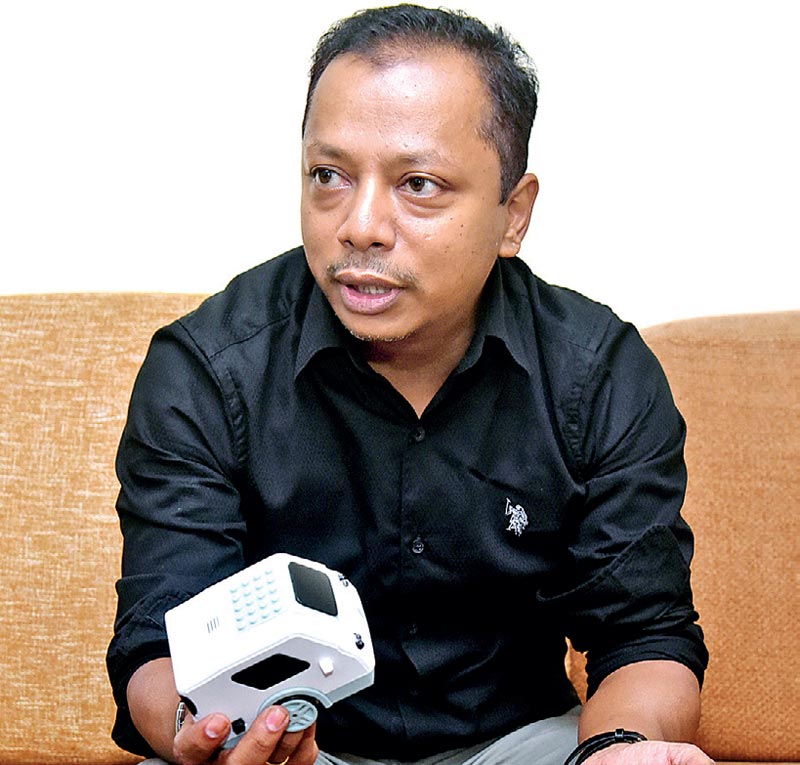Friday Feb 20, 2026
Friday Feb 20, 2026
Tuesday, 12 December 2023 01:21 - - {{hitsCtrl.values.hits}}

HappyMongo CEO Sivakarthikeyan Velayutham

HappyMongo Big Talk VR program and app for public speaking
 In view of these developments, allowing students and graduates to be industry-ready is the primary goal, said Velayutham when asked about the objectives of HappyMongo. He stressed that school students needed technology education irrespective of their field because AI already played a major role in every industry. He noted that simplistic teachings were not enough, but students needed to be educated with AI as is done in the industries they would venture into in the future
In view of these developments, allowing students and graduates to be industry-ready is the primary goal, said Velayutham when asked about the objectives of HappyMongo. He stressed that school students needed technology education irrespective of their field because AI already played a major role in every industry. He noted that simplistic teachings were not enough, but students needed to be educated with AI as is done in the industries they would venture into in the future
By Divya Thotawatte
In an effort to assist students keep abreast with the advancements of the ever-evolving digital landscape of today’s world, HappyMongo has expanded to provide technological education and training in Sri Lankan schools.
HappyMongo is an education-in-technology company based in Bangalore, India. The company works with schools across India, providing necessary education in technology for students, while training teachers to deliver lessons made available in the HappyMongo program. As it expands to Sri Lanka, HappyMongo will partner with local schools to provide education for students from kindergarten to Grade 13.
The technology-education company is looking at working with both private and Government schools in Sri Lanka. In its journey of reaching out to schools countrywide, a partnership between HappyMongo and UNESCO is in the works. The company is also looking forward to a partnership with M.D. Gunasena, the leading bookseller in Sri Lanka with an island-wide customer base.
HappyMongo CEO SivakarthikeyanVelayutham speaking to the Daily FT said they aim to set up AI labs in the schools they partner with and provide a program that includes AI education, robotics, cyber security and coding. He said HappyMongo provides a platform that includes essential features to deliver the program efficiently while promising to furnish the necessary equipment and material that could be used as the students are trained and educated in the schools.
To conduct lessons in accordance with the HappyMongo program, teachers will also be trained to utilise the platform, familiarising them with the modules and areas for teaching. The teachers already employed in the partnered schools would undergo training as needed. However, for schools that lack teachers trained in technology education, HappyMongo would provide trained teachers every three months.
“The teacher should be a graduate to start learning robotics and AI. From Grades 1-5, we only teach block coding that any graduate teacher could deliver. For advanced coding like Python, the teacher needs to be a computer science graduate as they should have a good understanding of Python.”
Why should technology be a part of school education?
As new advancements in technology are developed daily, the world adapts to those technologies, leaving behind those who do not keep abreast. Technologies such as AI have been influencing every industry such as healthcare, finance, education and security as they are developed with ability to perform and tackle complex tasks that need efficient and comprehensive processing and analysing of data, problem-solving, generating, etc.
Even creative industries have not been able to escape the clutches of AI, especially the Generative AI technologies that could generate text, images and videos. The past year has seen voice cloning technologies with high accuracy levels, those related to natural language generation, etc.
Every industry is yielding to digitalisation where the rapidly developing landscape of cyber security has become significant in the industry as the safety of personal, institutional and even governmental data is threatened by these advancements. Skills and knowledge in AI, cyber security, coding and robotics are therefore not only highly sought after, but also essential in surviving the future.
As industries adapt, so must we. In view of these developments, allowing students and graduates to be industry-ready is the primary goal, said Velayutham when asked about the objectives of HappyMongo. He stressed that school students needed technology education irrespective of their field because AI already played a major role in every industry. He noted that simplistic teachings were not enough, but students needed to be educated with AI as is done in the industries they would venture into in the future.
He explained, “We decided to start a program based on technology education because there are students graduating from colleges and universities but oftentimes, not industry-ready. Students will be learning English, Sinhala, and Tamil for 12-13 years, but when they enter universities to do programs like Engineering, they find the languages different, they would be faced with languages like Python and Java.
“During their 3-4 years in university, they will be able to pass the exams somehow, but after graduation, they will not be industry-ready because their basics are not strong. Therefore, we wanted to introduce technology education in the schools itself.”
 The platform includes modules on coding, artificial intelligence, robotics, etc. and activities for each module. Students will also undergo practical training through the AI labs installed in the schools as they partner with the company. The labs will be equipped with the necessary technology, including the technology to learn robotics
The platform includes modules on coding, artificial intelligence, robotics, etc. and activities for each module. Students will also undergo practical training through the AI labs installed in the schools as they partner with the company. The labs will be equipped with the necessary technology, including the technology to learn robotics
Velayutham elaborated that AI education was more than mere theory where everybody would experience it as the industries continue to automate artificial intelligence. The HappyMongo program allows students to engage with the practical aspects of the technologies they learn.
The HappyMongo program
The curriculum of HappyMongo is designed by the Central Board of Secondary Education (CBSE) together with Intel, the multinational technology company. It is also approved by the National Education Policy (NEP) 2020 of India that also recommended the incorporation of AI education to India’s regular study curriculum as a compulsory subject, and put into action last year.
With the involvement of the above institutions, the program has been created to be age-appropriate for students in each grade and will begin with the study of AI ethics. The curriculum has been created for students of Grades 6-12 and from Grade 6 onwards, students will start learning AI and coding.
Based on the curriculum, the HappyMongo platform that is also called FutoLearn, includes all the essential components for teachers, including teaching guides and lesson plans required for imparting the knowledge.
“We have created the content and all the learning material based on that curriculum that is inside our learning management system (lms) platform. We have a self-learning as well as a teacher-based program and students will have access to the syllabus curriculum, lesson outlines, power points, related media and activities on the platform.”
The platform includes modules on coding, artificial intelligence, robotics, etc. and activities for each module. Students will also undergo practical training through the AI labs installed in the schools as they partner with the company. The labs will be equipped with the necessary technology, including the technology to learn robotics.
The AI lab would be integrated with the HappyMongo platform and to make the studies more interesting, the labs include additional components like robots that would respond to the students’ coding.
Speaking on assessment methods, Velayutham said, “every quarter, we run the assessments and at the end of every year, we have hackathon programs. Students can come up with their own projects and present them in the presence of parents. Each module has its own assessment audits. There is also a dashboard where not only the teachers but the parents can also check the progress of their children through their Smartphone.”
Apart from technology education, HappyMongo also provides an English Language Lab, a complete English language program for schools from Grades 1 to 13.
“We have modules for reading, writing and speaking English. We also have a solution for public speaking. This is based on virtual reality where the students can practise public speaking while at home. We have created a mobile app that students can install and through a virtual reality experience (VR), they can get into any scenario they want. If they are preparing for an interview, they could get an interview room where a panel of interviewers would ask them questions,” he said.
Pix by Ruwan Walpola